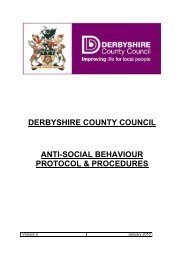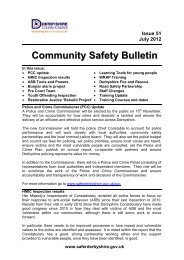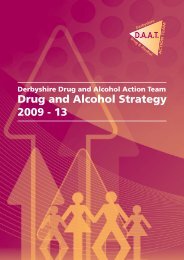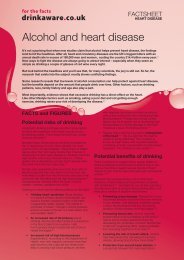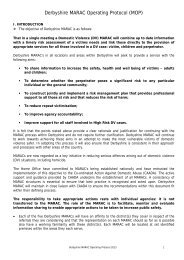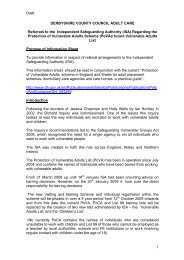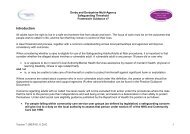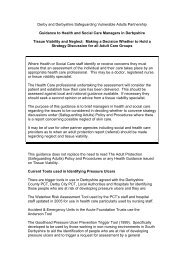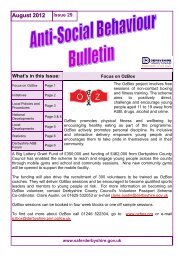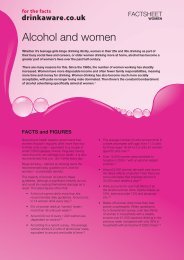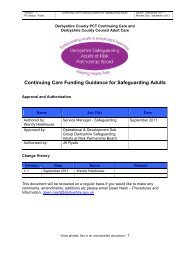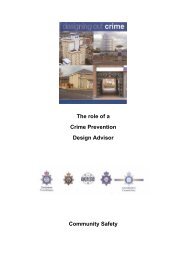Drinkaware Factsheet alcohol and pregnancy - Safer Derbyshire
Drinkaware Factsheet alcohol and pregnancy - Safer Derbyshire
Drinkaware Factsheet alcohol and pregnancy - Safer Derbyshire
Create successful ePaper yourself
Turn your PDF publications into a flip-book with our unique Google optimized e-Paper software.
FACTSHEET<br />
PREGNANCY<br />
baby starts to increase. But if you drink more than<br />
the recommended guidelines, you are taking a risk<br />
with your baby’s health. The more you drink, the<br />
more of a risk you are taking.<br />
• Miscarriage, stillbirth, premature birth <strong>and</strong><br />
small birth weight have all been associated<br />
with the mother binge drinking. (7) Binge<br />
drinking in women is defined as drinking<br />
more than six units on one occasion.<br />
• Other effects of drinking heavily in<br />
<strong>pregnancy</strong> include Fetal Alcohol Spectrum<br />
Disorder (FASD). Around 6,000 children are<br />
born with FASD each year. (8) Symptoms of<br />
FASD include:<br />
- Learning difficulties, problems with emotional<br />
development <strong>and</strong> behaviour, memory <strong>and</strong><br />
attention deficits, hyperactivity, difficulty<br />
in organising <strong>and</strong> planning, <strong>and</strong> problems<br />
with language<br />
- Facial deformities<br />
- Being small, at birth <strong>and</strong> throughout life<br />
- Poor muscle tone<br />
- As a result of their difficulties with learning,<br />
judgement, planning <strong>and</strong> memory, people<br />
with FASD may experience additional<br />
problems. These include psychiatric<br />
problems, a disrupted education, trouble<br />
with the law, <strong>alcohol</strong> <strong>and</strong> drug problems,<br />
<strong>and</strong> inappropriate sexual behaviour. (9)<br />
Children with FASD can have one or several of<br />
these symptoms. Children who display all of the<br />
symptoms are defined as having Fetal Alcohol<br />
Syndrome (FAS). (10)<br />
How a baby will be affected depends on how<br />
much its mother drinks <strong>and</strong> at what point in her<br />
<strong>pregnancy</strong>. For example, damage to the organs<br />
through heavy drinking is most likely to happen in<br />
the first three months. (11)<br />
ADVICE <strong>and</strong> GETTING HELP<br />
Although the healthiest option is to not to drink at<br />
all while pregnant, if you drink no more than one<br />
to two units, no more than once or twice a week,<br />
the risk of harming your baby is minimal.<br />
However, if you do drink, it is extremely<br />
important that you realise what a unit of <strong>alcohol</strong><br />
actually is. One drink is hardly ever just one unit.<br />
Even a small (125ml) glass of wine or a half pint of<br />
st<strong>and</strong>ard beer has one-<strong>and</strong>-a-half units.<br />
Our unit calculator www.drinkaware.co.uk/tips<strong>and</strong>-tools/drink-diary<br />
has all the information about<br />
how many units are in different measures of<br />
different drinks <strong>and</strong> br<strong>and</strong>s.<br />
What if you didn’t know you were pregnant<br />
<strong>and</strong> have been drinking?<br />
The Government advises that if you’re trying for<br />
a baby, you should stop drinking to avoid this<br />
situation. However, a lot of women drink in the<br />
early stages of their <strong>pregnancy</strong> – sometimes<br />
heavily – before they know they’re expecting. Stop<br />
as soon as you find out <strong>and</strong> if you’re concerned at<br />
all talk to your GP or midwife.<br />
For more information <strong>and</strong> advice on Fetal Alcohol<br />
Syndrome or Spectrum Disorder, go to the<br />
National Organisation on Fetal Alcohol Syndrome<br />
UK’s website, www.nofas-uk.org, or call their<br />
helpline on 08700 333 700.<br />
References<br />
1 Department of Health, Updated <strong>alcohol</strong> advice for pregnant women, http://nds.<br />
coi.gov.uk/environment/fullDetail.asp?ReleaseID=287152&NewsAreaID=2&Navig<br />
atedFromDepartment=False<br />
2 NICE, Antenatal care: Routine care for the healthy pregnant woman, http://www.<br />
nice.org.uk/nicemedia/pdf/CG062NICEguideline.pdf<br />
3 Gray, R & <strong>and</strong> Henderson, J 2006, Report to the Department of Health: Review<br />
of the fetal effects of prenatal <strong>alcohol</strong> exposure from the National Perinatal<br />
Epidemiology Unit, University of Oxford, May http://www.npeu.ox.ac.uk/<br />
downloads/reports/<strong>alcohol</strong>-report.pdf<br />
4 Kelly, Y, Sacker, A, Gray, R, Kelly, J, Wolke, D & Quigley, M 2008, ‘Light drinking<br />
in <strong>pregnancy</strong>: A risk for behavioural problems <strong>and</strong> cognitive deficits at three<br />
years of age?’, International Journal of Epidemiology, October.<br />
5 Gray, R & <strong>and</strong> Henderson, J 2006, Report to the Department of Health: Review<br />
of the fetal effects of prenatal <strong>alcohol</strong> exposure from the National Perinatal<br />
Epidemiology Unit, University of Oxford, May http://www.npeu.ox.ac.uk/<br />
downloads/reports/<strong>alcohol</strong>-report.pdf<br />
6 NHS Choices, Alcohol <strong>and</strong> Pregnancy, http://units.nhs.uk/<strong>pregnancy</strong>.html<br />
7 Gray, R & <strong>and</strong> Henderson, J 2006, Report to the Department of Health: Review<br />
of the fetal effects of prenatal <strong>alcohol</strong> exposure from the National Perinatal<br />
Epidemiology Unit, University of Oxford, May http://www.npeu.ox.ac.uk/<br />
downloads/reports/<strong>alcohol</strong>-report.pdf<br />
8 National Organisation on Fetal Alcohol Syndrome, www.nofas.org.uk<br />
9 BMA Board of Science, 2007, Fetal <strong>alcohol</strong> spectrum disorders: A<br />
guide for healthcare professionals, May, www.bma.org.uk/images/<br />
FetalAlcoholSpectrumDisorders_tcm41-158035.pdf<br />
10 Ibid.<br />
11 Ibid.<br />
Contents approved by <strong>Drinkaware</strong> Chief Medical Adviser, Prof. Paul Wallace BSc<br />
(Hons), MSc, MBBS, FRCGP, FFPHM<br />
<strong>Drinkaware</strong><br />
7-10 Ch<strong>and</strong>os Street<br />
London<br />
W1G 9DQ<br />
0207 307 7450<br />
The <strong>Drinkaware</strong> Trust<br />
Registered in Engl<strong>and</strong> <strong>and</strong> Wales No. 4547974<br />
A company limited by guarantee<br />
Registered Charity No. 1094586



